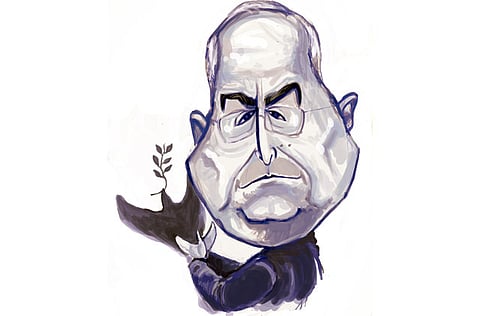Fayyad's peace plan has merit
Roadmap for the creation of a Palestinian state is based on action, not rhetoric, and puts the onus on Israel

A few days ago, a photo of Palestinian Prime Minister Salam Fayyad feeding a wrinkled Palestinian farmer out of his hand appeared in the Palestinian press — behaviour common for the late Yasser Arafat, but certainly unexpected from a rigid economist like Fayyad.
This falls in nicely with images of him taking part in a running race in Nablus, helping bake the world's largest knafeh, burning goods produced in colonies, planting olive trees, meeting with disabled Palestinian children, and dressing in the attire of Palestinian Bedouins.
He has also made sure that salaries are paid on time within the Palestinian National Authority (PNA), making use of $200 million (Dh734 million) he wrestled from the US Congress, trumpeting the fact that in 2009, the Palestinian economy in the West Bank grew 7 per cent.
Last month, however, Fayyad — aged 58 — gave an interview to the Israeli daily Haaretz, raising more than eyebrows, especially in the Gaza Strip, where he has absolutely no power base. Fayyad said he intends to declare a Palestinian state unilaterally by August 2011. In the meantime, airports, universities, roads, banks, hospitals, a stock market, and other vital institutions, will be created in the Palestinian state.
What is new is that Fayyad pledged himself to non-violence, "an ironclad commitment, not a seasonal thing" he noted, based on the experience of Martin Luther King and Mahatma Gandhi.
Fayyad's programme, which calls for a return of refugees and removal of all colonies in the West Bank, has already been blessed by the Quartet, and is reportedly supported by US President Barack Obama. His vision is to strengthen state institutions to lay the ground for emergence of the state in 2011, saying: "Let us not allow ourselves the luxury of acting as victims forever. This is a case of two opposed historical narratives. And if this is going to direct traffic in the future, we are not going too far. It's time to get on with it and end this conflict. Let's move on. Let's really look forward.
"It is possible. But I believe, instead of sitting on our hands and waiting to get a perfect alignment of the stars, if we get busy helping ourselves, in realising our dream of having strong and effective institutions of state, we make this outcome less likely."
Hamas is not pleased with Fayyad, and nor are his rivals in Fatah, certainly not Palestinian President Mahmoud Abbas. In an interview with Israel's Channel 2 TV, Abbas was asked whether the PNA intends to adopt the Fayyad Plan, to which he snapped: "No! We have no intention of making unilateral moves!"
Arab nationalists are also furious with Fayyad for reportedly saying that Palestinians and Israelis share the same values, and for preaching non-violence. In one of his interviews, Fayyad said that the Israeli government can find plenty of space for colonies within the valleys and hills of Israel — raising eyebrows among hardliners who claim, "These valleys and hills are as much yours — they are Palestinian land — as the lands of the West Bank."
What values, they ask, when the Zionist state was built upon an endless saga of blood, uprooting an entire population from its homes? Even hardliners in Israel are not pleased, with Foreign Minister Avigdor Lieberman saying, "I'm not interested in what Salam Fayyad declares. His pronouncements are not aimed at establishing a Palestinian state but rather to augment his political power."
Taken for granted
When Fayyad came to power in 2007, he was expected to be a figurehead — despite his long tenure at the World Bank and brief one as finance minister under Arafat. Hardliners scoffed at him as a political nobody while moderates believed he was too apolitical to threaten any of the heavyweights in Fatah.
Far from reeking of treason, Fayyad's proposal speaks of wisdom and vision for the Palestinian premier. Few people realise that back in 1952, then Egyptian president Jamal Abdul Nasser authorised continuation of indirect peace talks with the Israelis, through his press attaché at the Egyptian Embassy in France, Abdul Rahman Sadiq, and an Israeli diplomat.
In as much as Nasser saw Israel as a thorn in the Arab world, he realised that dealing with it was practically inevitable. He presented the Israelis with a proposal: to moderate the tone of Egyptian media, cease all attacks from Gaza, and use his country's heavyweight influence to secure Arab acceptance of the Jewish state in the Middle East.
In return, the Israelis would use their weight to secure an end of the British occupation of Egypt and withdrawal from the Suez Canal, which would become open to Israeli shipping once they are returned to Egyptian control. That plan never got past the drawing board, but it proves that leaders — real leaders, see the thin line between statesmanship and nation-building on one front, and political bravado on another.
Nasser — much like Arafat in 1974 — wanted the Israelis to see two sides to him; carrying an olive branch and a freedom fighter's gun. At the end of the day, Nasser in 1952 and Arafat in 1974 — just like Fayyad in 2010 — wanted one thing: a better life for their people. All three were fed up with bloodshed and war.
Now, if we observe the grassroots activities of Fayyad, we see him imitating Arafat — a trait that Abu Mazen never mastered — aimed at increasing his power base within the Palestinian Territories.
For the Fayyad Plan to work, however, it needs wise Israeli leaders to see the opportunity in Fayyad's proposal and build upon it, something that simply does not exist in Tel Aviv today.
- Sami Moubayed is editor-in-chief of Forward Magazine in Syria.


